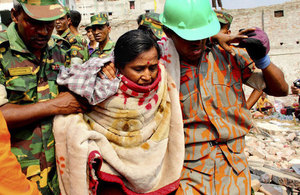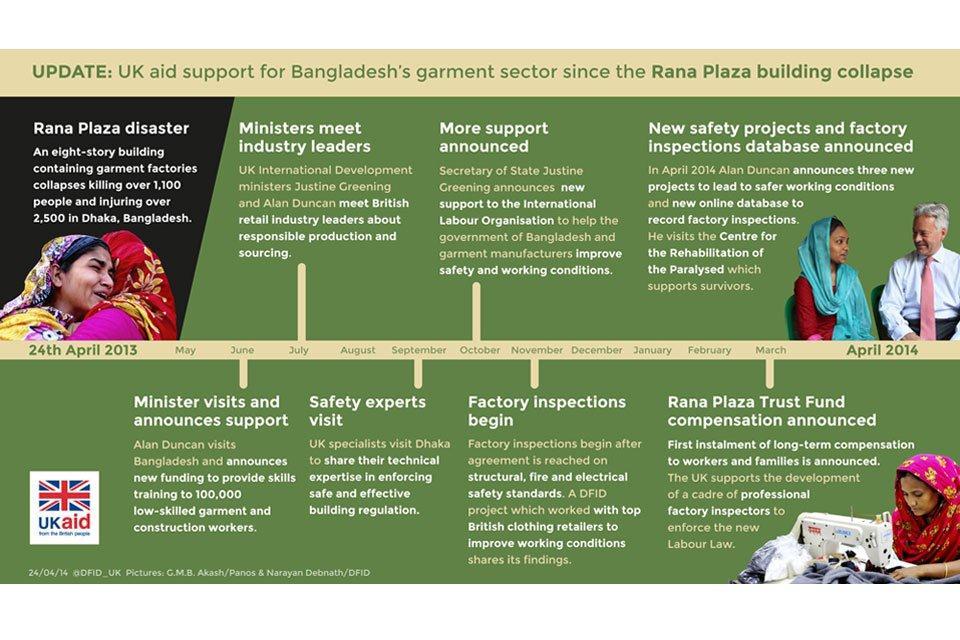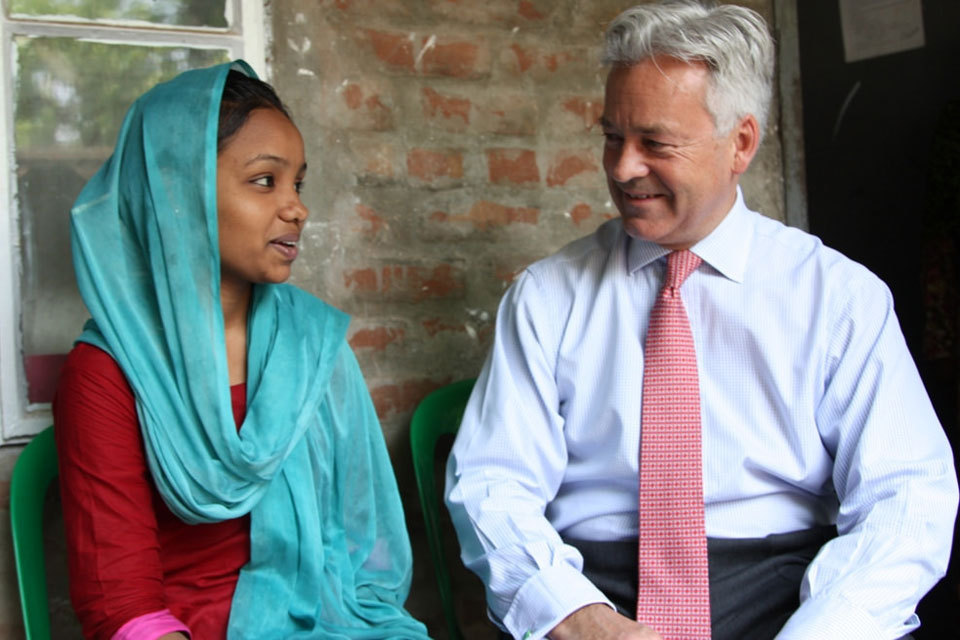Rana Plaza: one year on - UK aid to improve Bangladesh’s garment sector
The UK has ramped up efforts to improve safety and working conditions in Bangladesh’s garment sector since the Rana Plaza disaster in April 2013.

A woman is pulled from the rubble of the Rana Plaza complex in Savar by rescuers and civilian helpers. Picture: G.M.B. Akash/Panos.
The garment sector is vital to poverty reduction and the economic empowerment of women in Bangladesh. It gives women opportunities to work outside the home, earn their own money, and help support their family, and offers an alternative to early marriage.
However, the tragic Rana Plaza factory collapse in April 2013 shone a spotlight on the appalling conditions that workers in the developing world endure to produce cheap clothes.
One year on, significant progress has been made in improving building safety and working conditions, empowering workers, and urging buyers to take responsibility for their supply chain, from the store right back to the sewing machine.
Infographic: A timeline of UK aid since Rana Plaza - click here for full size version

Image: Timeline infographic of UK support to the Bangladesh garment sector
New UK aid supported projects
Improving working conditions
The UK is providing £1.8 million for the Trade and Global Value Chains Initiative (TGVCI) for partnerships between buyers, factory owners, and civil society to improve working conditions. This builds on the Responsible and Accountable Garment Sector Challenge Fund, which works with top British clothing retailers and others to improve conditions for garment workers.
During his visit to Bangladesh earlier this month, International Development Minister Alan Duncan announced 3 new TGVCI projects.
Safety inspected factories
A new database of ‘Ready Made Garments’ factory inspections will help British retailers make informed choices about the factories they work with.
It will set out which factories have been inspected by big brand initiatives the Accord and the Alliance and by Bangladeshi experts from the Bangladesh University of Engineering and Technology. There are currently 3,497 factories on the database, which lists the factory’s name, address and registration number, the name of the owner, the type of work carried out, and the number of employees.
Progress made by the UK supported International Labour Organisation (ILO) programme:
UK aid is providing £4.8 million to the ILO’s ‘Improving the Working Conditions in the Ready Made Garment sector in Bangladesh’ programme, to improve fire safety and protect workers. It has already made significant progress:
Factory inspections
Under the ILO programme, 200 preliminary structural, fire and electrical inspections of garment factories have been completed. Over the next year, the UK will support inspections at a further 1,300 factories not covered under the big-brand initiatives, which will inspect 2,000 factories between them.
Separately, the UK is supporting the establishment of a transparent, credible and efficient Inspectorate of Factories – a cadre of professional factory inspectors responsible for enforcing the new labour law. There are now 135 inspectors in place, with a further 200 promised in the next few months. These inspections will cover long-term issues such as payment of wages, working hours, payment of maternity and other benefits, as well as basic health and safety – open fire exits, proper evacuation procedures. The new labour law covers all factories in Bangladesh, and there will be 575 inspectors for 3500 garment factories.
The UK is working with the government of Bangladesh to ensure all factories are identified and brought into the inspection programme, even those which are small and unregistered. We are also supporting the development of a publicly accessible database which will have information on structural, fire and electrical inspections as well as labour inspections.
Health and safety
Through the ILO, a mass health and safety training programme for factory employees is being developed, along with a media awareness campaign to increase workers’ understanding of their right to a safe working environment. This programme will collaborate with Worker Participation Committees to give workers the knowledge and confidence to speak out about poor conditions, and with the new factory health and safety committees now required by law.
Rana Plaza survivors
Rehabilitation services for Rana Plaza survivors are now underway, including counselling and training for alternative livelihoods as part of our programme with the ILO.

On his visit to Bangladesh earlier this month Minister Alan Duncan meets Rabya, a Rana Plaza survivor at the Centre for Rehabilitation of the Paralysed in Savar, Dhaka. Picture: Narayan Debnath/DFID
The UK is also providing funding to support the Centre for Rehabilitation of the Paralysed (CRP), where a number of Rana Plaza victims who suffered spinal injuries or lost limbs are being helped. The Centre provides medical care, counselling, vocational training, rehabilitation and other support to people with disabilities.
The UK’s support for CRP includes training the survivors for alternative livelihoods, including through apprenticeships, to provide them with the practical skills they can use to work or start their own business. It will provide counselling and career guidance, form self-help groups, and place people in training or employment according to their needs. It will also work to increase access to employment and training opportunities for people with disabilities.
The UK government supports the Centre for Rehabilitation of the Paralysed through its Creating Opportunities for the Poor and Excluded (COPE) programme. Under the COPE project the organisation will be able to help another 13,000 people by 2016. To date, the Centre has directly benefitted over 111,000 people.
Industrial relations
The ILO’s ‘Better Work’ initiative will launch in mid-2014 to improve industrial relations, and will focus on strengthening dialogue between workers and management at the factory level and nationally.
The UK aid supported Creating Opportunities for the Poor and Excluded (COPE) programme in Bangladesh will provide advice and support to help garment workers understand and claim their rights. It will strengthen their understanding around safety and security, improve their negotiation skills, and encourage them to form functioning Worker Participation Committees.
Compensation
Rana Plaza compensation Coordination Committee has announced that all the garment workers and their families are to receive 50,000 taka (approximately £400) from the main voluntary Trust Fund, the first instalment of their compensation.
The UK has been working with retailers over the past year to encourage them to take responsibility for their supply chain. Primark have recently made an additional contribution to the central compensation fund, and started paying out long-term compensation to the workers at the factory within Rana Plaza that it sourced from.
The UK supports the Community and Legal Services project, which is helping NGOs to file public interest litigation to protect workers’ rights. This has led to an interim order from the Supreme Court freezing the bank account of the owners of Rana Plaza so these funds can be distributed to victims and their families as compensation. The Supreme Court has also instructed the government to form a panel to review the level of compensation for victims of industrial accidents.
Further UK support
Skills training
In June 2013, Minister of State Alan Duncan visited Bangladesh to discuss how the UK can support improvements in building standards. The Minister announced that the UK would fund skills training for 100,000 low-skilled garment and construction workers to improve overall productivity and help produce higher-value products. This is now underway.
Retailers’ roundtable
In July 2013, Secretary of State Justine Greening and Minister of State Alan Duncan hosted a meeting with 20 top British business leaders from the retail industry to discuss how they can work with the government to improve supply chains to ensure clothes are produced responsibly.
Expertise sharing
In September 2013, a team of UK experts from the Better Regulation Delivery Office and the Royal Institution of Chartered Surveyors went to Dhaka to share their wealth of experience in safe and effective building regulation to help prevent future tragedies and save lives.